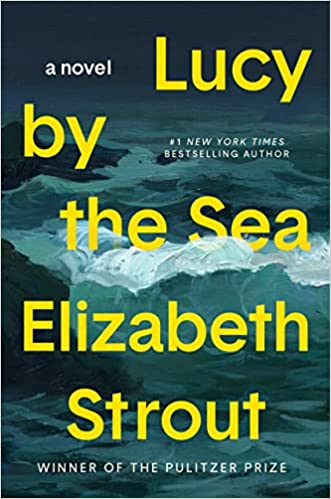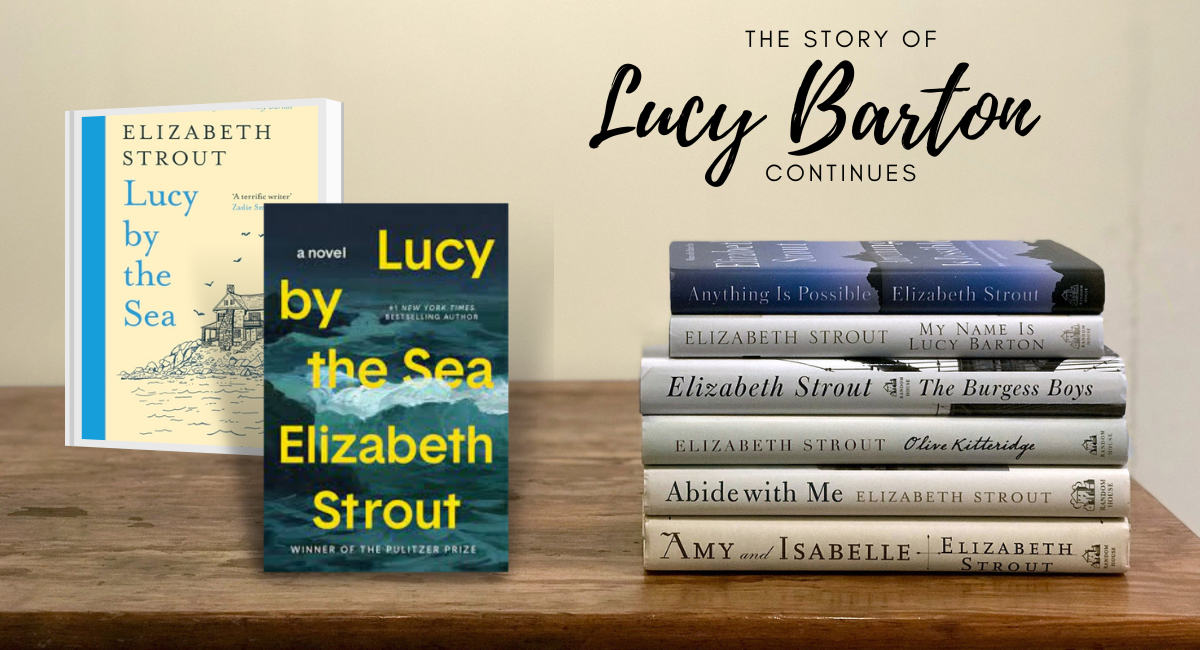Lucy By The Sea by Elizabeth Strout
A LONG-DIVORCED COUPLE’S UNEXPECTED BOND IN THE EARLY LOCKDOWN DAYS
In Elizabeth Strout’s latest novel Lucy By The Sea (Penguin Random House), Lucy Barton draws us right in with her first few words, understated, self-effacing and intimate: “Like many others, I did not see it coming. But William is a scientist, and he saw it coming; he saw it sooner than I did, is what I mean.” The “it” Lucy references is the Covid-19 pandemic, the bigger-than-life context for Strout’s third book about the indomitable Lucy.
William is not only Lucy’s ex-husband — a parasitologist with whom she has shared a twenty-year marriage, two now-grown daughters, and an on-and-off post-divorce friendship of as many years — but also the person she credits with having “ushered me into the world,” in the same masterful way William ushers in this latest story. In the spring of 2020, as the pandemic begins to grow, he convinces a reluctant Lucy to leave the dirty dishes in the sink of her New York City apartment and take temporary refuge on the rugged coast of Maine.
A PANDEMIC, LOCKDOWN AND THE OLD FLAME TROPE
Having lived apart for years, the two move into separate bedrooms in a small rental house with a glassed-in porch, perched on a cliff right above the ocean in the fictional town of Crosby. There they adjust to a new normal that logic insists will be temporary. Lucy fears trusting William again, and their connection is off more than on, but she sees glimmers of the old enduring love within his insistence that his priority in lockdown is to keep her alive.
They find solace in helping their daughters, both of whom struggle with marriage and job issues and whom they barely see. In loneliness and isolation, they draw comfort from signs that “the world has been through this before,” finding tombstones of young people who died in 1918-1919 during the last epidemic, and a tower utilized in WWII for German submarine sightings.
A POLITICALLY TENSE BACKDROP
As the shutdown goes global and the virus hits people close to them, temporary morphs into endless. Lucy notes the oddity of how “the mind does not take in anything until it can,” and how “it is a gift in this life that we do not know what awaits us.” In the wake of the George Floyd murder and the January sixth attack on the U.S. capitol, Lucy observes the “deep, deep unrest… and whisperings of a civil war” in this country and bemoans to William that “we are just tearing each other up.”
Strout excels at distilling complex human emotions — fear of failure, regret that we never measured up — into something familiar and understandable. Lucy wonders about getting ice cream when the server is wearing her mask below her nose. The aging William bemoans his regrets — cheating on Lucy and not making any real impact on the science he taught and loved — but manages to be present at the times when Lucy’s flashbacks of her impoverished childhood and still raw widowhood shut her down. Flawed as their relations sometimes are, they have each other, and that realization gives a nicely nuanced tenderness and hope to the novel.
THE STORY CONTINUES
Strout is up to her old tricks of moving her characters from one book to another, engendering a sense of community that feels authentic and small-town. Hence Lucy develops a new friendship with another Maine resident Bob Burgess, (a character from Strout’s earlier novel The Burgess Boys) whose “sweet bigness” comforts her. She also befriends a Maine nurse who works for Olive Kittridge, the wry protagonist of Olive Kittridge and Olive, Again (all from Penguin Random House).
Strout’s stunning debut of Lucy Barton, My Name Is Lucy Barton (Penguin Random House), focuses on Lucy’s impoverished childhood, faltering marriage to William and troubled relationship with her mother, and was a Booker Prize Longlist nominee in 2016. The second Lucy story, Oh, William! (Penguin Random House), is a vivid portrait of the many ties shared between newly-widowed Lucy and thrice-divorced William as they reconnect and was itself a Booker Prize Longlist nominee in 2022.
A read of all three books is recommended as a rich and highly satisfying experience of Strout’s impeccable character development. Nonetheless, Lucy By The Sea certainly holds its own as an engaging and relatable story, where human bonds of love and meaning — over-examined and frayed as they may become in crisis — still serve as the essence of what makes us feel we matter and belong.
About Elizabeth Strout:
Elizabeth Strout was born in Portland, Maine, and grew up in small towns in Maine and New Hampshire. From a young age, she was drawn to writing things down, keeping notebooks that recorded the quotidian details of her days. She was also drawn to books and spent hours of her youth in the local library lingering among the stacks of fiction. During the summer months of her childhood, she played outdoors, either with her brother, or, more often, alone, and this is where she developed her deep and abiding love of the physical world: the seaweed-covered rocks along the coast of Maine and the woods of New Hampshire with its hidden wildflowers.
During her adolescent years, Strout continued writing avidly, having conceived of herself as a writer from early on. She read biographies of writers and was already studying – on her own – the way American writers, in particular, told their stories. Poetry was something she read and memorized. By the age of sixteen, she was sending out stories to magazines. Her first story was published when she was twenty-six.
Since then, Elizabeth Strout has become a #1 New York Times bestselling author of Lucy by the Sea, which is shortlisted for the Booker Prize 2022; Oh William!; Olive, Again; Anything Is Possible, winner of the Story Prize; My Name Is Lucy Barton; The Burgess Boys; Olive Kitteridge, winner of the Pulitzer Prize; Abide with Me; and Amy and Isabelle, winner of the Los Angeles Times Art Seidenbaum Award for First Fiction and the Chicago Tribune Heartland Prize. She has also been a finalist for the PEN/Faulkner Award and the Orange Prize in London. She lives in Maine.





